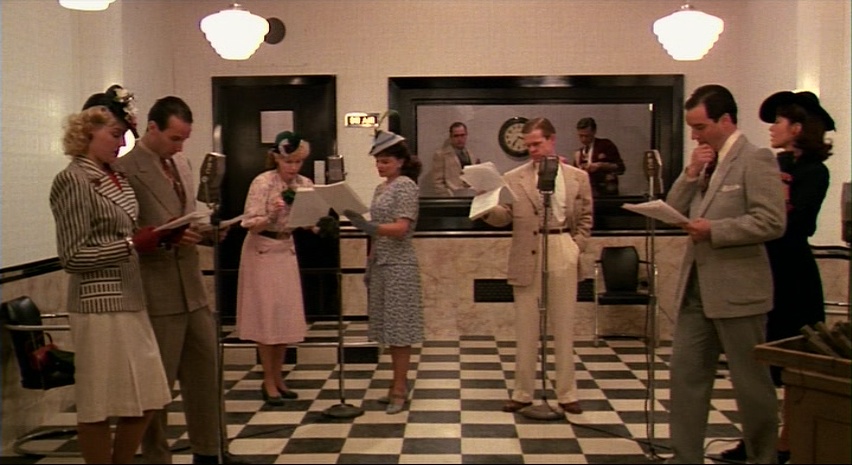 FILM
FILM In Which Whatever Woody Says Must Be True
 Thursday, July 2, 2009 at 10:04AM
Thursday, July 2, 2009 at 10:04AM 
Looking Glass
by GEORGIA HARDSTARK
As a child, when picturing myself as an adult, my imaginary life very closely resembled a Woody Allen film. Much like the beginning scene of Hannah and Her Sisters, a large part of my imaginary adulthood took place at a party. Glasses of wine clasped in one hand, the other hand gesturing wildly as I would surely be caught up in some argument or heated discussion, I would flit from room to room to check on guests, make sure the maid had enough petite food to pass around on shiny silver trays, all the while bitching about my mother. Boobs would be involved, too, as I would surely have grown them by then...large ones, actually, I assured my young and flat-chested self.

I look at my life now, and can’t help but think it was a detriment to my future that I was allowed, even encouraged, to watch Woody Allen movies as a child. "This is what Jews are like," I thought. “This is what adults are like."
If you’re one of my ex-boyfriends who had the opportunity to accompany me to one of my many family get-togethers (Hanukkah at my grandma’s house being the most hectic), you’d have seen that there was no reason for me not to think that Woody Allen movies might actually be documentaries, and not, in fact, fictional.

There is SO much going on. A drama in every conversation, a glass of wine in every hand, a complaint about one’s mother uttered at least hourly. The only one of my childhood fantasies that didn’t evolve into reality was the mammary-centric one (really, the most important one), as my breasts seemed to think that wine and hors d'oeuvres were enough to keep me happy as an adult.
Since many aspects of my life do resemble a Woody Allen film now, I couldn’t help but wonder which sister I most resembled, as I watched Hannah and Her Sisters last week. I was nothing like Mia Farrow’s character, the titular oldest sister, Hannah, I assured myself. Although the backbone of the family, the most stable and the one everyone seemed to rely and depend on much to her seeming comfort, I saw her as a pushover and much too trusting. That isn’t me...plus I have better hair. Probably to my detriment, I’m hypersensitive to other people’s intentions. Sure, I’d love a sister like Hannah, but aside from the fact that I find a young Michael Caine (playing Hannah’s husband) to be one sexy bitch, she and I have nothing in common.

Holly, played by the lovely Dianne Wiest, now she is the sister that scared me the most, because in the beginning of the movie I recognized more and more similarities between her character and myself. But by the middle of the movie, when she was berating Hannah after asking for yet another loan, taking bumps of cocaine during dates with small, balding Jewish men (SO not my type), and letting herself be walked on by domineering friends, I assured myself that this was not the sister I resembled.
This leaves us with Lee, the youngest of the sisters, played by Barbara Hershey. I am, indeed, the youngest of my siblings, so that’s an easy correlation to make. While I would never, not in a million years, have an affair with any married man let alone one that was married to my sister, Lee also found Michael Caine to be one sexy bitch, so there’s that correlation again. But that was just about where the similarities ended.
Aside from an affinity towards older bearded men and used bookstores, I was left once again to scramble to make connections with these fictional women, but I kept coming up short.
Once the movie was over, after everyone ended up happy and married and right back at a wine and hors d'oeuvres infested soiree, I realized that perhaps it was time for me to reevaluate my ideal adulthood fantasy, and to pick a new director to orchestrate my future. I’ve been holding on to this idea that I’m some quirky, neurotic Mia Farrow/Diane Keaton hybrid with better hair when in actuality, I’m less neurotic than inquisitive and bold, plus I look terrible in hats and becoming pregnant with Satan’s spawn is unlikely because I’m on the pill.
So Hannah can have her nitpicky life and her troubled sisters, as I’ve decided to mirror my adulthood daydreams after Spaghetti Westerns. At least this way I can prop my nonexistent boobs up with a corset instead of hiding them under a blazer and oversized tie.
Georgia Hardstark is the contributing editor to This Recording. She tumbls here, and blogs it all here. She last wrote in these pages about making up her mind.

"Bullet In My Breast Pocket" - Woody Allen (mp3)
"The Army" - Woody Allen (mp3)
"Private Life" - Woody Allen (mp3)

"Pets" - Woody Allen (mp3)
"The Lost Generation" - Woody Allen (mp3)
"My Marriage" - Woody Allen (mp3)







































